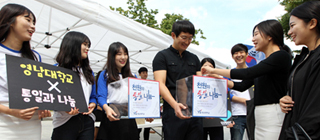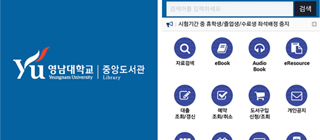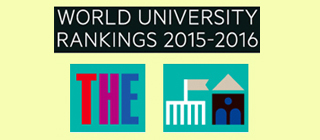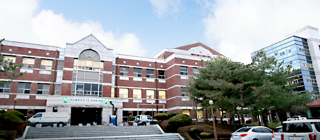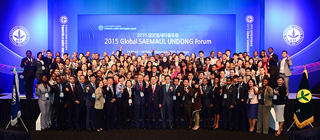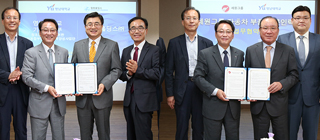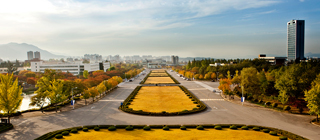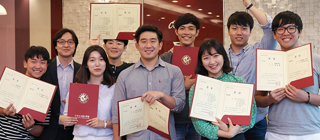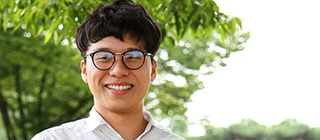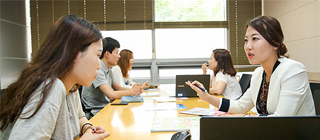-
Charity drives held around campus including library and streets. Joined by employees, faculty and students raising total of 6,715,400 won for the Reunification Sharing Fund Donated in full to the Reunification and Sharing Foundation [October 8, 2015] “The thousand won you share can be the cornerstone for reunification. Fellow school mates, let’s make reunification happen with our two hands.” From September 14, YU (President Noh Seok-kyun) held a campaign to collect reunification preparation funds. The YU student body and the Unification Issue Research Center (Chief Kim Young-soo) went on a ‘Thousand Won Sharing for Reunification’ donation campaign. As of October 2, a total of 6,715,400 won collected. Considering that the donations were made by young students, this is not a small amount of money. For this three-week-long campaign, the student body and the Unification Issue Research Center posted a message on the school homepage and Facebook asking for volunteers, and donation boxes were installed in areas with high pedestrian traffic such as the library and bank. They also made a Reunification Sharing Fund account so that anybody can make donations. They expressed a strong passion for reunification by delaying the charity drives while the ‘2015 Dokdo Protection Hip Hop Festival’, which was held together by the student body and Social Run To You (CEO Kim Tae-woo, 2011 YU student body president), was held in the evening of the 3rd at the outdoor auditorium. In result, 2 million won was raised on site to end the Reunification Sharing Campaign. YU student body president Kim Su-hyeon (26, School of Architecture, senior) said, “It was disappointing that our generation does not have much wish for reunification as we did not directly feel the sadness of being separated,” and added, “Preparing for reunification that will surely come, whether in our generation or the next, is meaningful and must be done. That is why we planned the ‘Thousand Won Reunification Sharing’ campaign. I hope that this campaign will make us desire reunification more.” Professor Kim Young-soo, who is the chief of the YU Unification Issue Research Center that co-planned this campaign, also worked hard in this campaign explaining the goal of this campaign and urging participation in class and to fellow professors.“ Professor Kim explained, ”Reunification is the biggest dream of our people, but we must make preparations for this to be a ‘blessing’.“ He also added, ”When just a thousand won is gathered at a time, and this continues, an expressway to unification will open wide.“ The YU student ambassadors, ‘YU Love’ also chipped in for this campaign. During recess from class, they engaged in street PR activities with the student body and installed and operated a donation tent in front of the central library. Choi Han-geul (25, Department of Business Administration, senior) who gladly made a donation on his way to the central library said, “Though I never gave reunification much thought, I was moved to see my school mates engaging in such campaign. I believe that when not just members of YU, but everyone in Korea contribute just a little bit each, it will become a path of hope to reunification.” YU President Noh Seok-kyun also sent a letter to the faculty during the campaign encouraging participation. In the letter, Mr. Noh said, “I am very proud of our students voluntarily making the Reunification Sharing Fund Campaign in hopes and preparation for reunification, which is the biggest dream of our people. I hope that we take this opportunity to think about the future of the unified Korea.” In result, school employees donated as little as ten thousand won to as much as two hundred thousand won to the Reunification Sharing Fund account, and over 50 YU professors also participated in preparation for reunification. The donations raised through this campaign by the YU student body and the Unification Issue Research Center donated all of the funds to the Reunification and Sharing Foundation. <See Article> Chosun Ilbo (Oct 8, 2015) http://news.chosun.com/site/data/html_dir/2015/10/08/2015100800378.html
-
Smart phone seating, ‘library app’ Constructed mobile-based library facility integrated management system Leading the education and administration sector ‘smart campus’ service and ‘3rd place in the world for e-learning’ [October 12, 2015] The YU (President Noh Seok-kyun) library is now in the palm of your hand in your smart phone. Following the world-class ‘e-learning’ education, mobile device-based administrative support systems were also introduced, as YU takes a step closer to the construction of the smart campus. Recently, YU constructed the ‘library facility integrated management system’ to provide efficient and comfortable library facility usage services to students. It will undergo a month of test services during October and after collecting opinions and suggestions from students on errors and complaints, it will begin operations in November. Students can install the ‘YU Central Library Application’ (hereinafter called library app) in their smart phones to use the service. Using the library app, students can search materials, renew rentals, request book purchases, etc through their smart phone. In particular, you can use the ‘mobile seating assignment service’ in the library app, which is expected to be of great help for student’s uses of the library. In the past YU students were assigned library seats through the integrated seat assignment device installed on the first floor of the central library and the second floor of the science library. But by adding the library seating assignment function in the library app, students can check library seating status from anywhere and reserve their seats. YU Department of Forest Resources and Landscape Architecture junior, Kim Su-jeong (21) said, “During exams, there were times that I had to go back disappointed even after coming to the library early in the morning and waiting in line for the seat assignment device because there were no seats left.” She added, “I no longer have to wait in line and can check in real time using the library app for whether there are any seats available and then make reservations right away.” In addition to making reservations for seats in the library using the library app, YU also made it possible for students to reserve digital materials, PC and DVD corners in the digital information room, and even group study rooms. YU President Noh Seok-kyun said, “In addition to education and research, advancing administrative services is also one of the top 10 policies of our universities,” and added, “We will do our best so that students will be able to more efficiently access and use such administrative services.” YU has already been recognized for its excellence in ‘e-learning’ by the world’s top MBA program, The Wharton School at the University of Pennsylvania and the world college ranking institute QS, ranking third in the world for the e-learning sector by ‘The Wharton-QS Stars Reimagine Education Awards 2014’ (Education Innovation Award). Thus, YU has already been recognized to have reached world-best levels in making education sectors smart. In light of this, the college’s administrative support system is also becoming smart. It introduced the first campus emergency rescue service ‘YU Care Call’ app for the first time in Korea in June, and with this library app, it is quickly going constructing the smart campus for YU.
-
One of the two most authoritative world college rankings together with QS 24 universities in Korea including YU ranked in top 800 universities of the world [Oct 5, 2015] YU (President Noh Seok-kyun) was ranked 14th in the nation and 601-800 in the world in the ‘2015-2016 World University Rankings’ held by the British college ranking institute, ‘THE (Times Higher Education)’. On the 30th of last month (local time), THE announced its list of the top 800 universities according to its world university rankings. According to this list, YU, a total of 24 Korean universities were included in the top 800 including Seoul National University (85), POSTECH (116), and KAIST (148). In the Korean college rankings based on this, YU was ranked 14th together with Kyungpook National University, Konkuk University, Sogang University and Chonbuk National University (in no particular order). First place in this ranking went to the California Institute of Technology (Caltech), followed by Oxford University of England, Stanford University of the US, Cambridge University of England, and the Massachusetts Institute of Technology (MIT) of the US, which took second to fifth places respectively. THE, which was established in 1971, announces world university rankings every year by comprehensively evaluating thirteen areas in five fields such as the △Teaching field 30% △Research field 30% △Thesis citations field 30% △International outlook field 7.5% △Industry income field. Together with the British QS (Quacquarelli Symonds), it is one of the two most authoritative global university assessment institutes. For one example, Seoul National University responds to only these two university rankings among the many in the world. Meanwhile, YU showed a stark rise in the ‘2015 Asia University Rankings’ announced by QS in June and ranked 135th in Asia. It rose 23 steps compared to the previous year in the academic evaluation, thus being 118th in Asia (16th in Korea). This was a significant feat in that Korean universities showed signs of slowing down overall. Based on these achievements, YU received ‘A ratings’, the highest ranking, in the ‘2015 University Structure Reforms Evaluation’ announced by the Ministry of Education in August. It was thus officially recognized for the school’s competitiveness. On these achievements, YU President Noh Seok-kyun said, “Our school’s prestige was objectively evaluated by a globally reputable university evaluation institute,” He added, “Based on such indices, I hope that not only YU, but other Korean universities as well will compete against prestigious universities around the world and raise the value of our education and research.”
-
Analysis on employment of third batch of law school graduates, second place in nation for general employment rates Great accomplishment following nation’s top passing rate of the 4th bar exam in 2015 Reconfirming prestigious status as cradle for legal professions [Sep 15, 2015] YU (President Noh Seok-kyun) reconfirmed that it is a prestigious university as a cradle for the legal profession. According to data submitted by the Ministry of Education to National Assemblyman Kim Jin-tae (Chuncheon) of the Saenuri Party, who is a member of the National Assembly Legislation Private Law Committee, the legal profession employment rate compared to the number of graduates in the third batch of graduates (2,000) of the 25 law schools in Korea, YU came in first place in the nation. The employment rate of the third YU Law School in the legal profession was 67.1%, followed by Pusan National University (56.7%), Wonkwang University (55%), and much higher than even Seoul National University, which recorded only 46.7%. Meanwhile, Sogang University had the lowest legal profession employment rate at 17.5%, which was outranked by Jeju National University at 20%, Chungbuk National University 34.3%, and Kangwon National University at 35%. The average legal profession employment rate of the 25 third law schools in the nation was only 44.9%. YU also took second place in the nation (80%) for general employment rates. The national average of the general employment rate of the third batch of graduates of law schools was 69.2%, and was in the order of Hanyang University (83%), YU (80%), Yonsei University (80%), Seoul National University (79.3%), and Sogang University (77.5%). The universities with the lowest employment rates were Jeju National University (30%), Kangwon National University (40%), Chungbuk National University (50%), Dong-A University (51.3%), and Wonkwang University (58.3%). Meanwhile, YU also rose to the top of the nation by recording a 98.44% passing rate (63 out of 64) for first-time test passing rate in the ‘4th Bar Exam’ announced in April. In the previous year, it was second place in passing rate in the nation in the 3rd bar exam, once again proving that it is truly a prestigious university and a cradle for the legal profession.
-
‘2015 Global Saemaul Forum’ held successfully Joined by over 600 people from 60 countries at the Gyeongju The-K Hotel on the 15th and 16th. Pursuing ‘Global Cooperation for a Safer and Happier World’ Historical launching of an ‘international organization’ for sharing the Saemaul Undong experience [Sep 15, 2015] <The ‘2015 Global Saemaul Forum’ was held on the 15th.> The ‘2015 Global Saemaul Forum’ prepared to share the academic value of the Saemaul Undong and the development experience of Korea with the world was held successfully in Gyeongju on the 15th. This forum, which was joined by over 600 people from upwards of 60 countries, was established to spread the pan-global consensus for overcoming poverty in emerging countries, and to search for international development cooperation plans for emerging countries in order to share the experience of the Saemaul Undong, which is a UNESCO Memory of the World as well as a community development research model to eradicate poverty for emerging countries in OECD’s (Organization for Economic Cooperation and Development), and to eliminate poverty, which is common task for the global community. This forum, which was co-hosted by the Global Saemaul Forum (Chairman Choi Wae-chul), Gyeongsangbuk-do (Governor Kim Gwan-yong), YU (President Noh Seok-kyun), and the Global Development Foundation, and sponsored by Daegu, Korea International Cooperation Agency (KOICA), Korea Saemaul Undong Center, Korea Rural Community Corporation, Daegu Chamber of Commerce, Korea Water Resources Corporation, and the Korea Trade Investment Promotion Agency, began on the 14th with a welcoming reception, followed by a ceremony to signal the start of the event on the 15th, and which went on to the 16th for a total of three days at the Gyeongju The-K Hotel and Hotel Hilton. The theme of this forum was, ‘Global Cooperation for a Safer and Happier World’. Participants included high ranking officials from both Korea and abroad such as Former Prime Minister Jung Hong-won, Former UN Director of the UN Convention to Combat Desertifictaion (UNCCD) Luc Gnacadja (Benin), as well as government, academic experts, and activists. At this forum were held over 60 keynote speeches, academic presentations, and debates for the mutual prosperity of the global community, as well as to practice and share the Saemaul spirit. On the last day of the forum on the 16th, the NGO ‘Global Saemaul Development Network (GSDN)’ was officially launched to systematically and continuously pursue the global Saemaul Undong. <YU President Noh Seok-kyun gives a welcoming address> At the opening ceremony on the 15th, Global Saemaul Forum Chairman (YU Vice President) Choi Wae-chul gave an opening address, followed by a welcoming address from Gyeongsangbuk-do Governor Kim Gwan-yon and YU President Noh Seok-kyun, and a congratulatory address by Daegu Mayor Kwon Young-jin and Korea Saemaul Undong Center Chairman Shim Yoon-jong. In his opening address, Mister Choi Wae-chul said, “As efforts to make Saemaul Undong into an academic discipline, which has been discussed in colleges and research institutes, the need for ‘Saeumaul Science’ was raised in 2007, and it came out into the world with the founding of the Korea Saemaul Society and the founding of the Global Saemaul Forum in 2008. Though the history of the Global Saeumaul Forum, which is currently in its eight year this year, may seem a bit short, I believe that due to the passion of the researchers and experts of Saemaul Science and the rapidly increasing demand for sharing of it among emerging countries, the responsibilities of the Global Saemaul Forum has become much heavier.” He added, “The Saemaul Undong is now going beyond being the Korean development experience and a pride of our people, but an asset that should be shared with humanity for the development of emerging nations. Korea received a great deal of assistance from the international society during its course of development to today, and such assistance that Korea received from the international community was not only economical, but includes the blood and tears of young men and women of various countries around the world. Our efforts to repay the blood of the youth around the country spilled during the Korean War should now be passed on to countries that need help today.” Chairman Choi also said, “Poverty is the cause of many tragedies occurring around the world. Poverty is not a problem for the people of emerging nations alone, but a common issue for all of humanity. Efforts to eradicate poverty are a priority for the global community for a ‘safer and happier world’.” He added, “It is essential to establish an international NGO that can research the Saemaul Undong and share it with the global community for the systematic and effective resolution of this global issue.” Following his speech, Former Prime Minister Jung Hong-won made his keynote address on ‘Making Humanity Happier by Sharing and Practicing the Saemaul Spirit’ and Former UNCCD Director Luc Gnacadja made his keynote speech on ‘Reducing Poverty and Strengthening Food Security through Soil Pollution Neutralization Strategies’. In his keynote address, Former Prime Minister Jung Hong-won said, “Korea’s development and growth, which I am sure will be deeply engraved in the history of humanity, is an advanced experienced that is a top subject of benchmarking among emerging countries. According to the analysis of the international society, the Saemaul Undong plays a critical role in the background of the development made by Korea.” He added, “Korea’s Saemaul Undong is a success model that shows the appropriateness and effectiveness of official development aid by the international society that is showing independent and sustainable development. There are growing anticipations that it will be an alternative to lead emerging countries to make sustainable development on their own, while realizing common values emphasized by the SDGs (Sustainable Development Goals) as a Post-2015 development agenda. Furthermore, Former Prime Minister Jeon said, “The Saemaul Undong suggests several directions so that it can be used as a major leverage in the path to a refined advanced society using sharing strategies for overcoming poverty in the global community.” He followed this by saying, “First, it is necessary to reestablish national awareness on the Saemaul Undong firmly. Second, there should be more positive responses for adding to official development aid funds requested by the international community by the Korean government. Third, efforts to practice and share the Saemaul spirit more assertively is necessary for the development of the global community. Fourth, major advanced countries in the international society working on overcoming global poverty should display more interest and efforts to systematically research the Saemaul spirit and principles to make it into an academic discipline so that it will be possible to foster relevant human resources. Lastly, it is necessary to establish an international organization that can continuously, systematically and effectively research the Saemaul Undong and to share it with the global community.” In the academic conference held following the keynote address, presentations and discussions were held by dividing into the Saemaul International Development Agenda I and II, and by regional sessions. The ‘Saemaul International Development Agenda I’ was made up of five sessions such as ‘Good Governance and Leadership’, ‘Poverty and Food’, ‘Population and Water’, ‘Climate Change and Natural Resource Management’, and ‘Fair Growth and Transparent Management’. “Saemaul International Development Agenda II’ was made up of the four sessions of ‘Public Health and Healthy Life’, ‘Gender Equality and Citizen Awareness’, ‘Education and Lifelong Learning’, and ‘Social Safety and Safe Communities’. For the ‘regional sessions’, they were divided into the four groups of ‘Asia I and II’ and ‘Africa I and II’, in which experts from countries around the world made presentations and held discussions. In the regional sessions, current and former high ranking government officials from emerging countries came to make keynote addresses, presentations and discussions. In the ‘Africa I’ session, Culture, Sports and Arts Minister of Kenya, Hassan Wario Arero gave a keynote speech, and in the ‘Asia I’ session, Former Vietnamese Vice Minister of Agriculture and Rural Development Ho Xuan Hung made a presentation. At each session, experts in various fields such as high ranking government officials, directors of public institutes, college deans, and prominent academic figures from both Korea and abroad participated en masse, gathering attention. In the morning of the 16th, KOICA President Kim Young-mok made a keynote speech on the ‘Post-2015 Development Agenda and Usefulness of Sharing the Saemaul Undong’. With YU Park Chung Hee School of Policy and Saemaul Dean Park Seung-woo overseeing the processions, a debate was held with the attendance of Rural Development Administration Lee Yang-ho, Vietnam Ho Chi Minh Academy Vice Director Nyugen Viet Thao, Korea Research Institute for Human Settlements Director Kim Dong-joo, Daegu Vice Mayor Jung Tae-ok, Kenya Vice Minister of Administration Daniel Waisiko Wambura, Peru Tambos Business Bureau Director Walter Lido Guillen Rojas, and UN Asia Pacific Telecommunications Education Center Director Lee Hyun-sook. In the final event of this forum in the afternoon of the 16th, a declaration was adopted by the participants for the organization of the ‘Global Saemaul Development Network’, and the NGO ‘GSDN’ made its historical launching. GSDN is an international non-government organization organized and prepared for a long time by the Global Saemaul Forum, and it will play a centrifugal role for sharing and spreading the Saemaul Undong such as training, educating, researching and consulting the Saemaul Undong, Saemaul spirit, and Saemaul development to the global community. Global Saemaul Forum Chairman Choi Wae-chul (YU Vice President) claimed the need for the establishment of an international organization to share the Saemaul spirit and Saemaul development with emerging countries in the First Global Saemaul Leaders Conference and the Global Saemaul Forum in 2014. Meanwhile, during the forum period, YU signed work MOUs with the Housing Construction Hygiene Ministry of Peru in South America and the Jomo Kenyatta University of Agriculture and Technology of Kenya in Africa.
-
Pyeonghwa Holdings and Sewon Group signs MOUs with YU Operation of programs linking college to employment in company Joint education reflecting corporate demands and strengthening practical capacities of students [Sep 22, 2015] <On the 21st, YU signed an MOU for the operation of an employment-linked program with Pyeonghwa Holdings.> YU (President Noh Seok-kyun) will pursue in full-fledge industry-academic specialized education programs by teaming up with strong mid-sized corporations in the region to help students find employment. YU’s representative specialization project team, the ‘Automobile Convergence Parts Creative Human Resources Fostering Project Team for Realizing a Creative Economy (Director Song Dong-joo)’ signed MOUs with a local automobile parts manufacturing company, Pyeonghwa Holdings (CEO Kim Dong-gwan) and Sewon Group (Chairman Kim Mun-ki) on the 21st and 22nd, respectively. The purpose of this is to operate programs linked to employment that can improve the practical capacities of students. First off, on the 21st, YU President Noh Seok-kyun met with Pyeonghwa Holdings CEO Kim Dong-gwan and agreed to operate a ‘Technician Academy’ to foster specialized technical personnel. The Technician Academy program is divided into the ‘education course after employment’ for new employees at Pyeonghwa Holdings and the ‘employment course after education’ for undergraduate students. With this MOU, YU will dispatch faculty in the education course after employment to Pyeonghwa Holdings and directly participate in education. For the operation of the employment course after education, it agreed to cooperate in recruiting students, developing curricula, and in education. In particular, they are planning to conduct education and field work for students by jointly developing an industry-academy specialization course (Pyeonghwa Track 1 and 2) in the employment course after education, so it is expected that they will be able to foster corporate customized technical personnel with practical capacities. CEO Kim Dong-gwan said, “With this MOU, students will be armed with capacities to carry out duties immediately upon graduation, and companies will be able to procure excellent technical personnel.” He added, “Industry-academic cooperation is a foothold for not only colleges and companies to develop, but also for the community to grow together. I hope that such industry-academic cooperation programs will continue to be expanded in the future.” <YU signed an MOU with the Sewon Group on the 22nd and agreed to operate an employment-linked long-term field work program.> YU also signed a work MOU with Sewon Group (Chairman Kim Mun-ki), an automobile parts manufacturing company. At 11 a.m. on the 22nd, YU President Noh Seok-kyun and Chairman Kim Mun-ki agreed to foster company-customized personnel and operate an internship (long-term field work) program through industry-academic cooperation. With the signing of this agreement, the two institutes agreed to ▲pursue educational courses to resolve mismatching between students and companies ▲develop and operate educational courses to support employment customized to industries ▲pursue YU student intern projects ▲pursue full-time employment through evaluations after internships by utilizing the capacities of the two institutes. In particular, YU is planning to organize a regular curriculum (Sewon Chassis Process Design 1, Sewon Chassis Process Design 2) to foster customized technical personnel for juniors and seniors in the School of Mechanical Engineering) and offer it from the first semester of 2016. Sewon Group will begin internship programs for seniors in their second semester for those who completed the regular curriculum and employ full-time employees every year after making evaluations. Chairman Kim Mun-ki said, “Through the signing of this MOU, colleges and companies will be able to operate long-term programs linked to opening educational courses, selecting students, operate field work, and finally result in employment.” He added, “Good human resources are the competence of companies. We hope that the university and company will work together to foster outstanding human resources.” YU and the two companies are planning to install operating committees for the operation of these programs. The operating committee will be composed of no more than three persons recommended by the CEO of the companies and no more than three persons appointed by the president of YU to develop and operate educational courses to foster human resources needed by the company. YU President Noh Seok-kyun said, “YU’s industry-academic cooperation that worked hard for the employment of students is finally beginning to bear fruit,” and added, “We will continue to do our best to strengthen industry-academic cooperation and develop employment-linked programs in various tracks so that students will be able to gain employment in their desired companies.”
-
Over 97 points out of 100, best ranking ‘Free quota adjustment’ without forced reduction of quota [Aug 31, 2015] YU (President Noh Seok-kyun) received an A rating, the highest rating in the ‘2015 College Structure Reform Evaluation’ by the Ministry of Education. On the 31st, the Ministry of Education announced the results of the college structure reform evaluation carried out for 163 four-year colleges throughout the nation. According to this, the colleges were evaluated into 34 colleges receiving As, 56 Bs, 36 Cs, 26 Ds, 6 Es, and five that received separate measures. YU received 97 out of 100, shining even among the colleges that received A ratings. It received nearly perfect marks on all twelve evaluation items including faculty procurement rate, education expense return rate, student recruitment rate, graduate employment rate, student learning capacity support, and employment and start-up support. On this, YU President Noh Seok-kyun said, “This was possible thanks to the efforts of all our members to improve the school’s competitiveness in education and research.” He added, “We will not sit satisfied with these results, but do our best to take another step further to become a prestigious private university in the world.” Meanwhile, the Ministry of Education evaluated education conditions, academic affairs management, student support, educational achievement, mid and long-term development plans, education course, and specialization for five months from April to August. Taking into consideration the differences in scores among colleges and percentages according to the total score, the Ministry of Education divided them up into Groups 1 and 2. In Group 1, those scoring 95 or higher who were placed in A ranks, 90 or higher in B, and 90 or lower as C. In Group 2, those over 70 were ranked as D, while those under 70 as E. Based on the results of the evaluation, the Ministry of Education is planning to pursue feasible quota reductions such as recommending differentiated reduction rates of admission quotas and to preemptively prepare for a drop in the school-going population. According, schools with A ratings are subject to voluntary reduction of admission quotas, and will be able to adjust their quota at their discretion rather than being forced by the Ministry of Education. Colleges that received B, C, D and E ratings will be recommended to reduce their quotas by 4 to 15%.
-
Students of the School of Food Science and Food Service Industry wins Excellence and Consolation Prizes at the ‘2015 High ratings for proposing tourism model integrating their majors [Sep 9, 2015] <Students of the School of Food Science and Food Service Industry who won the excellence and consolation prizes at the 2015 Tourism Institute of Northeast Asia International Collegiate Contest> (from left to right top row, Dean Kim Dong-jin, Lee Jong-gyeong, Tae Sung-min, Park Jong-gook, from left to right bottom row, Park Min-seung, Ha Gu-rin, Yoon Tae-woong, Lee Hyeon-gyeong, Choi Bong-jong ) YU students received the excellence and consolation prizes at the ‘2015 Tourism Institute of Northeast Asia International Collegiate Contest’ with unique Korean tourism ideas. The winners the School of Food Science and Food Service Industry team comprised of juniors Yoon Tae-woong (23), Park Jong-gook (23) and sophomores Choi Bong-jong (24) and Park Min-seung (22), and the team comprised of senior Yoon Sang-geun (25) and juniors Lee Jong-gyeong (22), Tae Sung-min (23), Ha Gu-rin (22), and Lee Hyeon-gyeong (21). The Tourism Institute of Northeast Asia International Collegiate Presentation Contest that began in 2011 was established for the development of the tourism industry in Northeast Asia and to foster personnel in the industry. This year’s competition that was hosted by the Tourism Institute of Northeast Asia and sponsored by Daegu Metropolitan City and the Korea Tourism Organization was joined by over 200 students from 67 teams from 40 universities both in Korea and Japan. This year’s competition that was held under the theme ‘Studies on Plans to Activate Network Experience Tourism’ held the main presentation competition at the Interburgo Hotel (Suseong-gu, Daegu) on August 26 after preliminaries held in July. In result, two teams from the YU School of Food Science and Food Service Industry received an excellence and consolation prize. The Yoon Tae-woong, Park Jong-gook, Choi Bong-jong and Park Min-seung team took home the excellence prize with the theme ‘Proposal of Tourism Model Linked with the Food Tourism Age-Constructing Regional Networks of Food Towns’. They proposed plans to link regional restaurant stamp tours with the regional food towns, and received good evaluations. The Yoon Sang-geun, Lee Jong-yeong, Tae Sung-min, Ha Gu-rin, and Lee Hyeon-gyeong team’s presentation was on ‘Network Experience Tourism Activation Plans through Regional Folk Festivals and establishing the <Paldo Folk Village>’, proposing the establishment of a general folk village containing the various cultural features of Korea, for which they won the consolation prize. Park Min-seung, who received the excellence prize, said, “The School of Food Science and Food Service Industry is a discipline that deals not only with food, but a variety of fields such as management and tourism. I think we had good results as we integrated food culture with tourism taking advantage of what we learned in our major,” and added, “This competition was a good opportunity for us to expand the spectrum of our major and to gain a broader perspective.”
-
School of Chemistry senior Park Min-gyu develops next-generation energy source ‘methane’ generation catalyst Achieved low-cost, high efficiency compared to existing catalysts Clue to solving both environmental and energy issues [Sep 9, 2015] An undergraduate student of YU made headlines by publishing his thesis in the world’s most authoritative SCI international academic journal. Park Min-gyu (23) is a senior currently enrolled in the School of Chemistry. His study was recently published in one of the world’s most acclaimed academic journals in the mechanics sector in the upper 1.46% titled, <Energy Conversion and Management (IF), 4.38)>. Park’s paper, ‘Development of Carbon Dioxide Methane Fuel using Double Layer Membrane of Titania (TiO)/Copper-Titania (Cu-TiO)’. It has already been released online and it is scheduled to be published in the journal that will be issued on October 1. Park’s thesis was a study on the production of methane, a main ingredient of natural gases that is receiving attention as a next-generation energy source. Park processed a powder ‘copper-titania’ by adding copper ion that has high conductivity in titania that reacts to light to cause catalyst activation into a dough-form. Then, it was coated with a double layer to use as a carbon dioxide reducing agent. In the past, expensive catalysts such as ruthenium (Ru) or palladium (Pd) in order to create methane by deoxidation of carbon dioxide. However, Park’s study has allowed it to to cut costs drastically and raise efficiency for the process of producing methane using carbon dioxide. The issue of exhaustion of energy due to the continued use of fossil fuels and the global warming issue resulting from the increase of carbon dioxide have recently become global issues. Therefore, this research, which achieved cheaper costs and higher efficiency for generating methane through the deoxidation of carbon dioxide is receiving high levels of attention as it provided a first step to simultaneously solve both environmental and energy issues. YU Professor of Chemistry and Biochemistry Kang Mi-sook (46), who participated in this study as a correspondence author, said, “This study provided a technical basis to convert carbon dioxide, which is the main cause of global warming, into the useful fuel of methane using photochemistry methods.” She added, “It will contribute in the development of an eco-friendly natural circulation system that will be able to solve the energy depletion and environment restoration issues that the world will is now facing.” In fact, the YU School of Chemistry and Biochemistry Mineral Materials Chemical Research Lab (Advisor Kang Mi-sook) is already well known for its research capacities. Last year, undergraduate students published five papers in SCI level journals. Also undergraduate and graduates received a total of 12 awards in various academic conferences held both in Korea and abroad such as the 2013 ‘Nano Korea 2013’ excellent presentation award and the ‘ISGMA 2013’ excellent presentation award. Furthermore, students won the ‘Graduate School Catalyst Research Award’, which is given to graduate students with exceptional research achievements annually by the Korean Institute of Chemical Engineers, for three consecutive years. Park Min-gyu, who said that he is highly interested in developing materials useful to humans while focusing mainly on research in catalysts, stated, “I am still in my infancy in terms of research capacities as I am an undergraduate. I was lucky with this research because I just followed the instructions of my professor.” He added, “After I graduate, I want to enroll in graduate school and study and research the catalyst field more in depth.”
-
Selected as Donga Ilbo ‘2015 Youth Dream University’ Praises for the YU career development process (CRM) Succeeded in constructing circulating start-up ecosystem such as stark rise in start-up clubs in the past 3 years [Sep 8, 2015] <Students are receiving counseling from employment/start-up consultants. (Touring employment career consulting center program)> YU’s excellent employment/start-up support capacities were once again proven. YU was assessed as ‘excellent university’ in the ‘2015 Youth Dream College’ evaluations conducted by Donga Ilbo and Channel A together with Deloitte Consulting. The Youth Dream College, which is in its third year this year, assesses how efficiently and assertively upper-ranked colleges with excellent education conditions provide support for student employment and start-ups. The Youth Dream College was selected based on the satisfaction level of students and college infrastructure for 52 four-year universities in the five areas of ▲counseling support ▲information support ▲opportunity support ▲curriculum ▲start-up support. YU was selected as a ‘Youth Dream College’ last year and received an upgraded assessment to ‘Excellent Youth Dream College’ this year and, thus became a ‘Youth Dream College’ for two consecutive years. When excluding employment rates and assessing only the university’s employment/start-up support capacities, YU was found to be in the top ten nationwide. YU’s assertive employment support that is systematically carried out from the freshmen and sophomore grades stands out the most. YU established a career development program (Career Road Map, ‘CRM’) for students to set their goals upon enrollment and to systematically design their college life. In order to make it possible to continuously set career paths and develop experiences from the freshman to senior year, it operates a program based on CRM that encompasses not only general education and major education, but also extracurricular education courses. Furthermore, in order to identify the salary and employment region desired by students, as well as their aptitudes, students are required to answer each item in this school’s unique CRM from their freshman year. When adding career experience and qualification certificates every school year, it matches these to suggest even exact company names. The employment consultants provide counseling based on these concrete consulting materials. <2014 YU Start-up Culture Road Show> YU’s distinguished start-up education was judged to be a successful model for the activation of student start-ups. Step-by-step start-up education programs are offered according to the level of users to strengthen the start-up capacities of students. Various start-up education courses are provided to help students become interested in starting up businesses and eventually actually starting their own venture. In particular, the number of start-up clubs increased four-fold in the past three years. The 14 clubs in 2012 increased to 61 last year. The start-up club is very encouraging in that it helps students come up with their own ideas and actively prepare to start their own business. YU Employment Support Team Director Kwon Oh-sang said, “We have developed and are operating various career management programs and capacity strengthening programs in various departments in our university to help student successfully take their first step into society,” and added, “If students show more interest in such programs and utilize them, their college life will be very fulfilling.”
